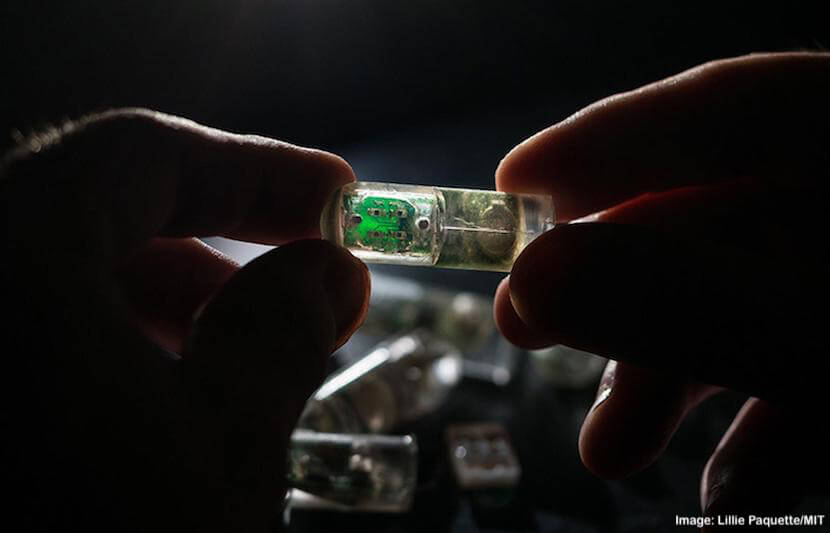-
Ingestible Sensor Can Detect Stomach Bleeding, Disease
MIT researchers have developed an ingestible sensor that can detect stomach bleeding or other gastrointestinal problems, and relay the information to a nearby smartphone. Working in the field of synthetic biology, the researchers infused an electronic sensor with genetically modified bacteria that can emit light in response to blood and convey the information via wireless… Read More
-
Do Common Vitamins and Minerals Really Help Your Health?
Do you take general vitamin and mineral supplements each day? You may not need to, according to a new study led by St. Michael’s Hospital and the University of Toronto. The researchers found that the most commonly used vitamin and mineral supplements, including multivitamins, vitamin D, calcium and vitamin C, don’t provide any consistent… Read More
-
Tiny Ultrasound-Powered Robots Remove Harmful Bacteria From Blood
Engineers at the University of California San Diego have developed microscopic robots that can swim through blood and remove harmful bacteria and toxins. These nanorobots are about 25 times smaller than the width of a human hair, and could lead to an efficient and safe way to decontaminate biological fluids in the body. The research… Read More
-
How to Ace Take-Home Exams
It’s the middle of the semester, and your professor makes an announcement that gives you an initial perk: “The next exam will be a take-home.” Your mind begins racing with joy. You think of the opportunity to use your notes, the endless cups of coffee you can drink at home, and the ability to… Read More
-
How To Buy the Best Laptops and Electronics for College Students
In today’s increasingly digital age, buying the right laptop and electronics for college is a top priority. Between researching and writing papers, keeping up with social media, binge-watching Netflix, and working on creative side projects, technology holds the key to our success (and sanity) throughout those four years. But shopping for the right tech can… Read More
-
No More Chores: Robot ‘Agents’ Will Do Them All
Have you ever fantasized about having a robot sidekick? How about a machine for all your daily, time-consuming household chores, so you can sit back and relax? That could well be in our future if a team of researchers headed by MIT and the University of Toronto has anything to do with it. The researchers… Read More
-
Here’s How You Can Avoid Accidental Social Exclusions
Ostracism, or social exclusion, is thought to be an intentional method to punish disagreeable, awkward, or unwanted members in a group. For instance, if someone is seen as freeloading or annoying, they might be excluded from different social circles or events. But, according to researchers Björn Lindström and Philippe Tobler from the Department of… Read More
-
Dining Out? Pay Attention to the Music Before You Order
Would you still be in the mood for a cheeseburger and fries if soft, calming music is being played at a restaurant? According to a new study by the University of South Florida, the answer is probably not. The USF researchers found that background music in a restaurant has an impact on diners’ food… Read More
-
Here’s Why Time Shrinks Before an Upcoming Task or Appointment
An hour of free time feels much shorter when you have an upcoming task or appointment, new research proves. Through a series of studies, researchers at The Ohio State University found that time management before a scheduled event is often less productive than it could be. “We seem to take a mental tax out of… Read More
-
Physical Books or E-Readers: Which Option Do Millennials Prefer?
In today’s increasingly technology-driven society, millennials are often stereotyped as being “all about digital.” It will come as a surprise then that, when it comes to reading, the younger generation may actually prefer curling up with a physical book over an e-reader, much more so than the older generation, according to a new study. In… Read More
-
Why Men and Women Navigate Differently
Women tend to wander and take well-known routes to reach a familiar destination, while men prefer to take shortcuts and reach a destination more quickly, according to a new study. Led by Alexander Boone, a graduate student in the Department of Psychological and Brain Sciences at UC Santa Barbara, the study is comprised of two… Read More
-
A Human-Like 3D-Printed Smart Gel That Can Operate Underwater
A team of engineers from Rutgers University–New Brunswick has created a human-like 3D-printed smart gel that can walk underwater as well as grab and move objects. This new technology could lead to the development of soft robots that can mimic an octopus’s ability to walk underwater and bump into things without causing damage. In addition,… Read More
-
String of ‘Highly Qualified Teachers’ Crucial for Student Success
Whether or not students graduate from college could be traced back to the quality of their high school teachers, a new study suggests. If students in high school are taught by a succession of teachers who majored or minored in their specific teaching subjects, rather than just a general teaching degree, they are more likely… Read More
-
What Vitamin B12-Infused Plants Would Mean to the World
Vegans, vegetarians and those who can’t afford meat may no longer be faced with vitamin B12 deficiency, an issue that has long affected plant-based eaters, thanks to new research from the University of Kent, UK. Vitamin B12 (or cobalamin) is an essential dietary component that is neither made nor required by plants, leaving a large… Read More
-
Is It Just a Fling, or Are You in It for the Long Haul? Here’s How You Can Tell
How can you tell if someone you just started dating will be your future spouse, or is just a few-month fling? Conventional wisdom and corny love stories tell us that the difference between “the one” and a short-term relationship is obvious. But, according to a new study, it’s not so clear at first. Research from… Read More

Natalie Colarossi
-
How to Ace Take-Home Exams
It’s the middle of the semester, and your professor makes an announcement that gives you an initial perk: “The next exam will be a take-home.” Your mind begins racing with joy. You think of the opportunity to use your notes, the endless cups of coffee you can drink at home, and the ability to… Read More
-
How To Buy the Best Laptops and Electronics for College Students
In today’s increasingly digital age, buying the right laptop and electronics for college is a top priority. Between researching and writing papers, keeping up with social media, binge-watching Netflix, and working on creative side projects, technology holds the key to our success (and sanity) throughout those four years. But shopping for the right tech can… Read More















